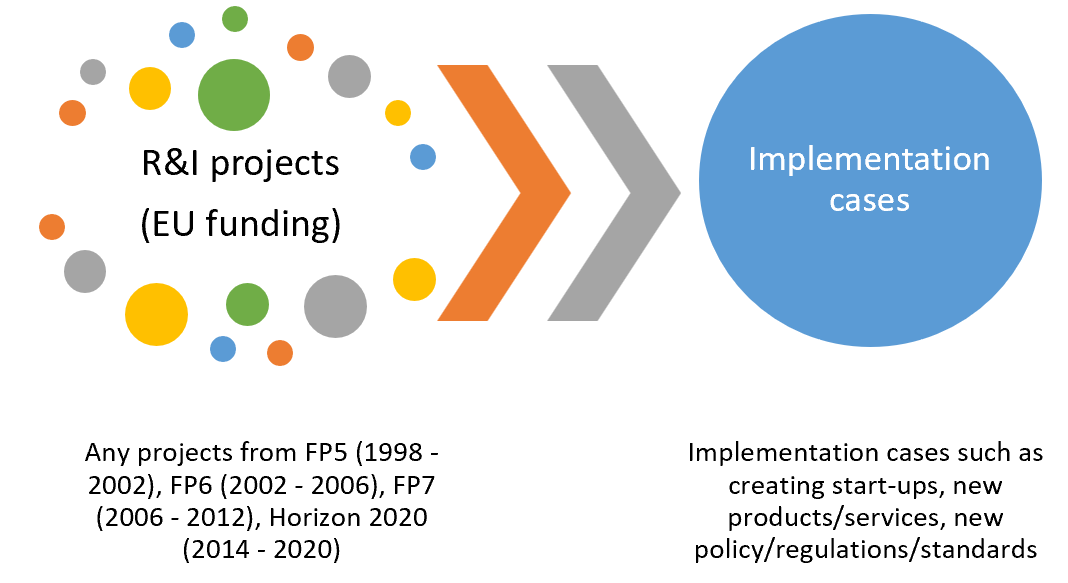Friday, April 23rd, 2021

“We need three key factors to lead successful commercialisation of R&I results: demands from customers, capable R&D expertise, and ambition to make R&I results implemented. Therefore, an EU funded R&I project consortium needs R&D organisations, potential customers, and people with ambition to create new business from outcomes of the project.” – Jan Tore Pedersen, owner and managing director of Marlo a.s, and co-founder of MIXMOVE (a start-up created based on results of an FP7 project, the iCargo project).
If you have been a partner of an EU funded project and implemented project outcome, please submit your implementation case, (info@etp-logistics.eu ref: Implementation Cases), i.e. a concrete example in which R&I projects’ results have been further developed and have been deployed as commercial solutions, have generated a new market or have contributed to new policies or regulations. The call is open continuously. During 2021, we will focus on coordination, collaboration, urban logistics, asset sharing and efficient use for freight transport and logistics.
All collected cases that demonstrate achievements of impact generations of R&I projects will be eligible for the ALICE Innovation Award, launched by ALICE and its members. You are welcome to submit your implementation case, and ALICE will announce 8 awards on various logistics subjects in the next 3 years (2021 – 2023).
In the past few decades, the logistics sector has experienced revolutionary shifts in technologies, business models, policies and legislation, driven by globalisation, digital technologies, fast growth of e-commerce, and increasing concerns on climate change and environment. These developments have not only improved the efficiency of the sector while reducing emissions, but also boost development of the sector, thus strengthening the role of the sector in the economy overall.
Outcomes of EU funded R&I projects have been a key facilitator here through developing and piloting innovative technologies, solutions and services, demonstrating new business models, supporting policy development and facilitating cross-sector cooperation. There have been many good practices and lessons learnt from implementation of outcomes of EU funded R&I projects.
The logistics sector would hugely benefit from a systematic and logic summary of good practices and lessons learnt and the dissemination of these results. At the BOOSTLOG launch event held on 26 March 2021, we invited 3 successful implementation cases to present their journeys from EU funded projects to the launch of new start-ups, successful products and services (the event’s presentations are available here).
If you are a practitioner who has implemented outcomes of EU funded R&I projects, make your story heard and your achievements recognised. Your story will help to shape future public funding programmes in the logistics sector and inspire partners of R&I projects to generate a bigger impact.
In the past few decades, the logistics sector has experienced revolutionary shifts in technologies, business models, policies and legislation, driven by globalisation, digital technologies, fast growth of e-commerce, and increasing concerns on climate change and environment. These developments have not only improved the efficiency of the sector while reducing emissions, but also boost development of the sector, thus strengthening the role of the sector in the economy overall.
Outcomes of EU funded R&I projects have been a key facilitator here through developing and piloting innovative technologies, solutions and services, demonstrating new business models, supporting policy development and facilitating cross-sector cooperation. There have been many good practices and lessons learnt from implementation of outcomes of EU funded R&I projects.
The logistics sector would hugely benefit from a systematic and logic summary of good practices and lessons learnt and the dissemination of these results. At the BOOSTLOG launch event held on 26 March 2021, we invited 3 successful implementation cases to present their journeys from EU funded projects to the launch of new start-ups, successful products and services (the event’s presentations are available here):
If you are a practitioner who has implemented outcomes of EU funded R&I projects, make your story heard and your achievements recognised (please contact Yanying Li, Head of Programmes and Knowledge Management, ALICE). Your story will help to shape future public funding programmes in the logistics sector and inspire partners of R&I projects to generate a bigger impact.
The project consortium is led by the Alliance for Logistics Innovation through Collaboration in Europe, ALICE, and consists of 12 ALICE members representing different stakeholders: R&D (ZLC, ICCS, Fraunhofer IML and TU Delft), government (TKI DINALOG), Company (HACON, FIT, Fundación Valenciaport), Civil Society (Smart Freight Centre SFC) and Collaborative Networks and Clusters (VIL, CLOSER and ERTICO-ITS Europe).
About ALICE: The European Technology Platform ALICE is set-up to develop a comprehensive strategy for research, innovation and market deployment of logistics and supply chain management innovation in Europe. The platform will support and assist and advise the European Commission into the implementation of the EU Program for research, e.g. Horizon Europe in the area of Logistics. For more information about ALICE, please visit the website: https://www.etp-logistics.eu/, follow ALICE on LinkedIn and join our LinkedIn discussion group, sign up for the ALICE newsletter here.